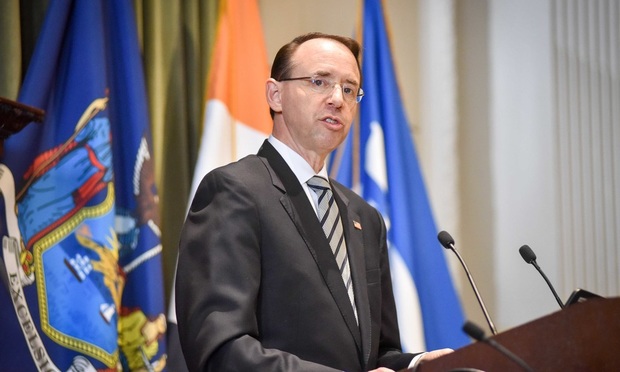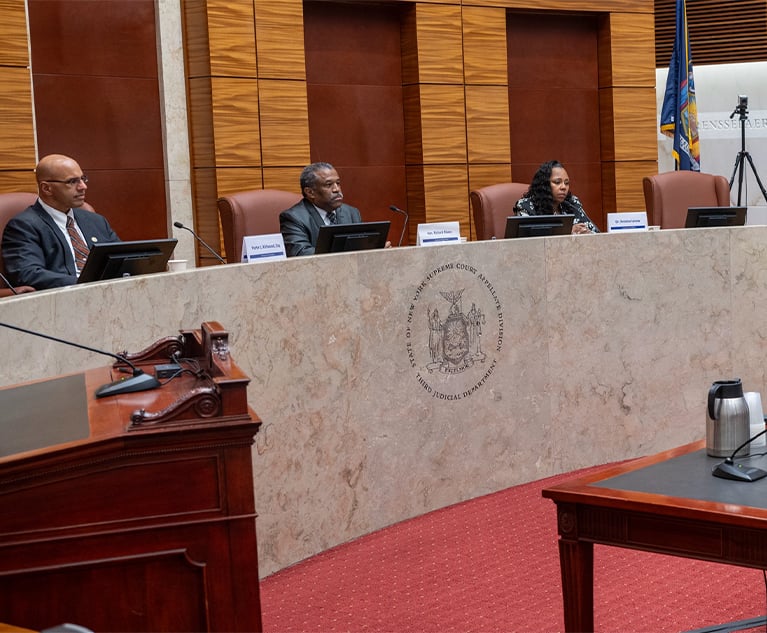Rosenstein: DOJ, in Policy Shift, to Avoid 'Pile-On' Penalties in White-Collar Enforcement
During a speech in Manhattan on Wednesday, Deputy Attorney General Rod Rosenstein said the department wanted to go after individual wrongdoing at companies to deter future bad actors—not simply force companies into big civil settlements.
May 09, 2018 at 01:06 PM
4 minute read
 Rod Rosenstein, deputy attorney general of the United States, delivers a lecture on white-collar crime at the New York City Bar Association on May 9, 2018. (Photo: David Handschuh/NYLJ)
Rod Rosenstein, deputy attorney general of the United States, delivers a lecture on white-collar crime at the New York City Bar Association on May 9, 2018. (Photo: David Handschuh/NYLJ) The U.S. Department of Justice will no longer “pile on” enforcement penalties against white-collar offenders in an effort to avoid what Deputy Attorney General Rod Rosenstein called “unfair duplicative penalties” in remarks delivered Wednesday morning.
Rosenstein, whose speech kicked off the New York City Bar Association's annual white-collar crime institute, pitched the policy change as a way of streamlining enforcement across agencies, while addressing fairness concerns he said were coming from within the DOJ itself.
“Our prosecutors and civil enforcement attorneys prize the department's reputation for fairness,” Rosenstein said. “They understand the importance of protecting our brand. They asked for support in coordinating internally and with other agencies to achieve reasonable and proportionate outcomes in major corporate investigations.”
The deputy AG said companies are deprived of the benefits of certainty and finality when faced by a multi-agency “pile-on” investigation. Innocent employees, customers and investors who want to resolve the issue and move on needed to be considered. And the department needed to weigh resources being devoted to “an old scheme” versus “fighting a new one.”
“This is another step towards greater transparency and consistency in corporate enforcement,” Rosenstein said. “To reduce white-collar crime, we need to encourage companies to report suspected wrongdoing to law enforcement and to resolve liability expeditiously.”
Rosenstein noted that, on principle, companies should not have the threat of prosecution hung over their heads solely to persuade them to settle for big amounts in civil cases.
The new department policy, then, will mean greater coordination inside the department to “achieve an overall equitable result” for companies being investigated. This may include the crediting of financial penalties, and other “means of avoiding disproportionate punishment.”
The department will also seek to coordinate with other federal partners, as well as state, local and foreign authorities, when seeking to resolve a case with a company for the same misconduct.
Prosecutors will be directed to weigh a series of factors, including the seriousness of the wrongdoing, statutory penalty mandates, the risk of delay in bringing closure, and how well a company behaved in the process.
Rosenstein pointedly noted that “cooperating with a different agency or a foreign government is not a substitute for cooperating” with the DOJ, and the department “will not look kindly” should companies come to the DOJ only after having failed to play the various actors for a better deal elsewhere.
In the end, Rosenstein said the goal is deterrence, which means keeping the focus on individuals, rather than simply punishing companies as harshly as possible. The hope is that this focus will incentivize companies into cooperating early and often when these kinds of actions arise.
“Corporate settlements do not necessarily directly deter individual wrongdoers,” Rosenstein said. “They may do so indirectly, by incentivizing companies to develop and enforce internal compliance programs. But at the level of each individual decision-maker, the deterrent effect of a potential corporate penalty is muted and diffused. Our goal in every case should be to make the next violation less likely to occur by punishing individual wrongdoers.”
Rosenstein noted that some skeptics may wonder how good a policy that was only internal to the department and not, as he acknowledged, enforceable in court is really going to be. Based on his years of experience, he said the policies do have an impact on the discretion prosecutors take in their cases.
“We don't want to limit the discretion of the Department of Justice. What we want to do is channel and guide it, and make sure that all of our employees are following the same general guidelines,” the deputy AG said.
This content has been archived. It is available through our partners, LexisNexis® and Bloomberg Law.
To view this content, please continue to their sites.
Not a Lexis Subscriber?
Subscribe Now
Not a Bloomberg Law Subscriber?
Subscribe Now
NOT FOR REPRINT
© 2025 ALM Global, LLC, All Rights Reserved. Request academic re-use from www.copyright.com. All other uses, submit a request to [email protected]. For more information visit Asset & Logo Licensing.
You Might Like
View All

Law Firms Expand Scope of Immigration Expertise Amid Blitz of Trump Orders
6 minute read
'Reluctant to Trust'?: NY Courts Continue to Grapple With Complexities of Jury Diversity
Trending Stories
- 1Uber Files RICO Suit Against Plaintiff-Side Firms Alleging Fraudulent Injury Claims
- 2The Law Firm Disrupted: Scrutinizing the Elephant More Than the Mouse
- 3Inherent Diminished Value Damages Unavailable to 3rd-Party Claimants, Court Says
- 4Pa. Defense Firm Sued by Client Over Ex-Eagles Player's $43.5M Med Mal Win
- 5Losses Mount at Morris Manning, but Departing Ex-Chair Stays Bullish About His Old Firm's Future
Who Got The Work
J. Brugh Lower of Gibbons has entered an appearance for industrial equipment supplier Devco Corporation in a pending trademark infringement lawsuit. The suit, accusing the defendant of selling knock-off Graco products, was filed Dec. 18 in New Jersey District Court by Rivkin Radler on behalf of Graco Inc. and Graco Minnesota. The case, assigned to U.S. District Judge Zahid N. Quraishi, is 3:24-cv-11294, Graco Inc. et al v. Devco Corporation.
Who Got The Work
Rebecca Maller-Stein and Kent A. Yalowitz of Arnold & Porter Kaye Scholer have entered their appearances for Hanaco Venture Capital and its executives, Lior Prosor and David Frankel, in a pending securities lawsuit. The action, filed on Dec. 24 in New York Southern District Court by Zell, Aron & Co. on behalf of Goldeneye Advisors, accuses the defendants of negligently and fraudulently managing the plaintiff's $1 million investment. The case, assigned to U.S. District Judge Vernon S. Broderick, is 1:24-cv-09918, Goldeneye Advisors, LLC v. Hanaco Venture Capital, Ltd. et al.
Who Got The Work
Attorneys from A&O Shearman has stepped in as defense counsel for Toronto-Dominion Bank and other defendants in a pending securities class action. The suit, filed Dec. 11 in New York Southern District Court by Bleichmar Fonti & Auld, accuses the defendants of concealing the bank's 'pervasive' deficiencies in regards to its compliance with the Bank Secrecy Act and the quality of its anti-money laundering controls. The case, assigned to U.S. District Judge Arun Subramanian, is 1:24-cv-09445, Gonzalez v. The Toronto-Dominion Bank et al.
Who Got The Work
Crown Castle International, a Pennsylvania company providing shared communications infrastructure, has turned to Luke D. Wolf of Gordon Rees Scully Mansukhani to fend off a pending breach-of-contract lawsuit. The court action, filed Nov. 25 in Michigan Eastern District Court by Hooper Hathaway PC on behalf of The Town Residences LLC, accuses Crown Castle of failing to transfer approximately $30,000 in utility payments from T-Mobile in breach of a roof-top lease and assignment agreement. The case, assigned to U.S. District Judge Susan K. Declercq, is 2:24-cv-13131, The Town Residences LLC v. T-Mobile US, Inc. et al.
Who Got The Work
Wilfred P. Coronato and Daniel M. Schwartz of McCarter & English have stepped in as defense counsel to Electrolux Home Products Inc. in a pending product liability lawsuit. The court action, filed Nov. 26 in New York Eastern District Court by Poulos Lopiccolo PC and Nagel Rice LLP on behalf of David Stern, alleges that the defendant's refrigerators’ drawers and shelving repeatedly break and fall apart within months after purchase. The case, assigned to U.S. District Judge Joan M. Azrack, is 2:24-cv-08204, Stern v. Electrolux Home Products, Inc.
Featured Firms
Law Offices of Gary Martin Hays & Associates, P.C.
(470) 294-1674
Law Offices of Mark E. Salomone
(857) 444-6468
Smith & Hassler
(713) 739-1250







